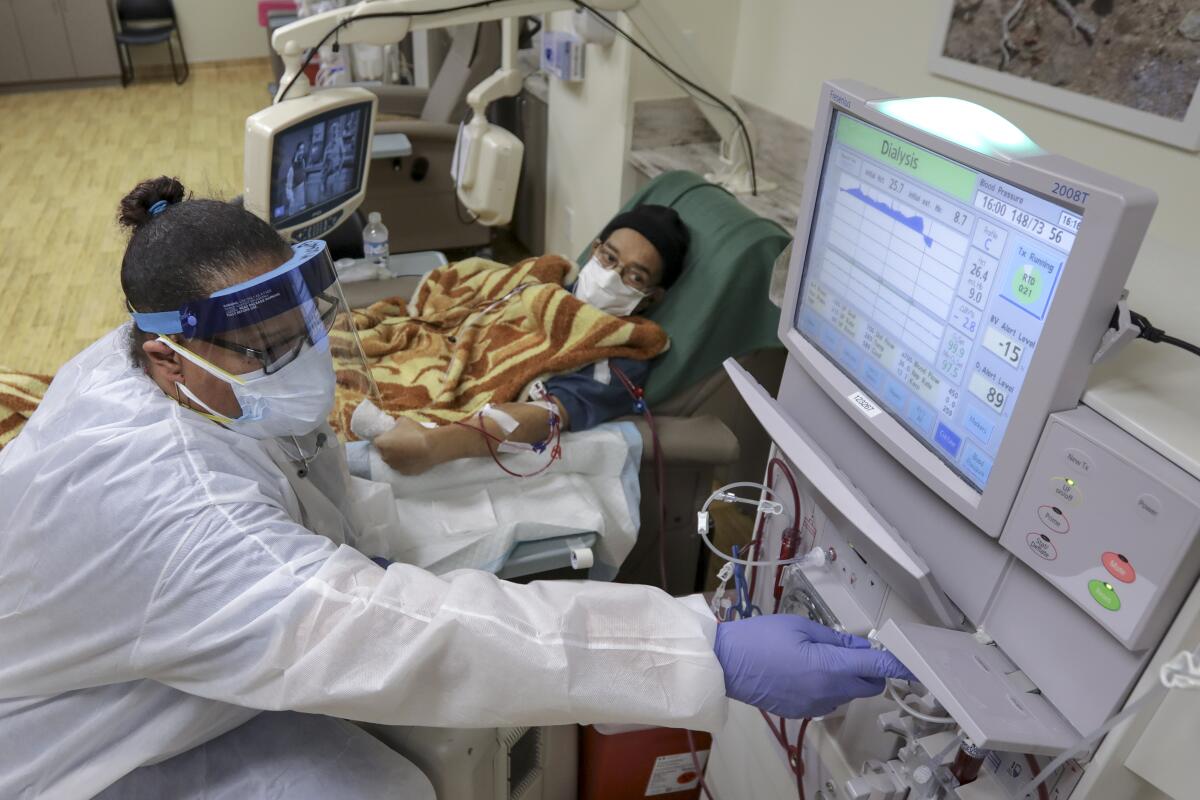No on Prop 23. It would raise costs and not improve kidney patients’ care

- Share via
For the second time in two years, California voters will be asked to play the role of healthcare regulators and set rules for how dialysis clinics operate in this state. And once again, they’ll be offered a seemingly appealing way to make clinics safer. But just as they smartly rejected a ballot measure in 2018 that sought to increase clinics’ spending on nurses and technicians, they should reject an initiative this year to increase clinics’ spending on doctors. Proposition 23 — like Proposition 8 in 2018 — would raise costs without delivering a meaningful improvement in the quality of care.
Dialysis patients have their blood removed, filtered and reinjected three times a week, and if they miss any of these four-hour sessions, the results can be fatal. Complicating matters, they tend to have multiple serious health problems beyond the failure of their kidneys; according to the Center for Medicare and Medicaid Services, heart disease, high blood pressure, vascular disease and diabetes were all common ailments among the patients in California in 2018. The average clinic in the state had about 11 patients die over the course of 2018.
That’s lower than the national average both in number and in percentage, according to federal statistics. Nevertheless, the Yes on 23 campaign, which is funded by the Service Employees International Union-United Healthcare West, argues that the clinics aren’t safe enough. The measure would require clinics to keep a medical doctor on duty whenever patients are treated; report the number of infections quarterly to state health officials; not discriminate against patients on Medicare or Medicaid and obtain state approval before closing or substantial reducing services.
Supporters of Proposition 23 argue that the new mandates are necessary to safeguard patients against profiteering and corner-cutting by the two multibillion-dollar corporations that operate most of the country’s dialysis clinics, DaVita and Fresenius. Not coincidentally, the SEIU-UHW has been trying in vain to organize those companies’ clinics in California, a campaign the union has tried to advance through a series of ballot measures and legislative proposals.
One insurmountable problem for the proposition, though, is that its supporters have not offered any evidence that its mandates are either necessary or helpful for patients.
The most consequential provision in Proposition 23 is the mandate to have a doctor on site at all times. Supporters say the doctor is needed to recognize when a patient is slipping into a crisis during treatment. But the proposition wouldn’t require an M.D. who specializes in dialysis or emergency care — any doctor would suffice (and if there’s a demonstrated shortage of doctors, any nurse practitioner or physician’s assistant). Besides, the people best able to tell when complications arrive are the ones who’ve been trained to do just that: the nurses and technicians who deliver the care.
It’s true that dialysis patients often wind up in the hospital or the emergency room. Compared to the large number of treatments delivered over the course of the year, however, the number of problems experienced by each clinic is low (and lower in California than the national average, according to federal statistics). That may explain why neither the federal government nor any other state requires clinics to keep a doctor on hand, largely idle, to help out when something does go wrong. Instead, each clinic is required to have a physician overseeing all of its patients’ care, and each patient has a kidney specialist or affiliated professional who checks in on them weekly while they’re being treated.
The one sure result of the doctor-on-duty mandate is that it would raise the cost of care. Opponents argue that clinics would trim their hours and open fewer new locations as a result, which would make it harder for patients to get treated. It also is likely to drive up the cost of patients’ bills, which would be a particular hardship for patients in California who are covered by Medicare — they have to cover the 20% copay out of pocket because Medigap policies here do not cover dialysis.
Proposition 23 is opposed by a long list of patient advocates, medical professionals and other civic groups; the only endorsements its proponents tout are those from the California Labor Federation and the California Democratic Party. The Yes campaign argues that voters should ignore the opposition because, like federal regulators and state lawmakers, the opponents have all been co-opted by DaVita and Fresenius.
But voters are not the ones who should be deciding how best to keep patients safe. Those decisions should be based on research and medical science, not politics. Voters should reject Proposition 23 and tell the SEIU-UHW to stop hijacking the initiative process for its organizing campaigns.
More to Read
A cure for the common opinion
Get thought-provoking perspectives with our weekly newsletter.
You may occasionally receive promotional content from the Los Angeles Times.









